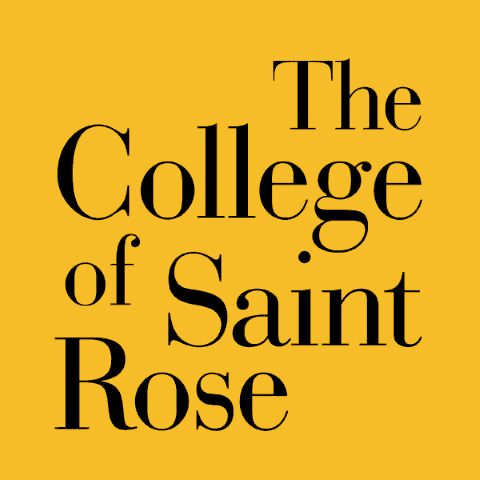“We are Partners in this Journey!
Saint Rose students: If there’s *one piece of advice your professors want you to heed in order to be successful it’s this:
Zumrut Akcam, Assistant Professor of Computer Science: Note-taking is an important part of every lecture. It helps students to highlight the important parts of the course and increases their attention to the course. Also, it is ideal to do a short review before and after the class, including reading summary/highlights of the book and checking out your class notes.
John Avitabile, Associate Professor; Department Chair, Computer Science: Be confident that you can succeed.
 Cailin Brown, Associate Professor; Department Chair, Communications: Good listening skills matter in a journalism classroom, or any classroom.
Cailin Brown, Associate Professor; Department Chair, Communications: Good listening skills matter in a journalism classroom, or any classroom.
Active listening skills mean students are focused on the course material and the instructor and are taking notes. Students who actively listen also ask relevant questions of their instructors, which in turn helps those students better understand and engage the material.
Amina Eladdadi, Associate Professor of Mathematics: Practice makes perfect! I constantly remind our students to practice [math] and encourage them to persist if they want to become proficient and succeed at it.
Be a partner in learning! To put our students at ease and to empower them, I kindly explain to them that we are partners in this journey. I encourage them to engage in respectful and fruitful discussion, ask questions, require them to participate in class and work in teams.
Robert Flint, Professor; Department Chair, Psychology: While it may seem obvious to many, especially junior and seniors, I think it is critical for new first-year students to understand how important it is to show up to class both prepared and on time.
Arriving to class late results in missed announcements and material and it will disrupt the class, leading the professor to a negative opinion of the student. Arriving to class prepared means, at a minimum, that the student has thoroughly read the material that will be reviewed/discussed/lectured-on that day in class.
These are the two most significant behaviors, in my opinion, that have major detrimental effects on student academic performance.
A close third would be time management. Most students seem to be unable to or unwilling to develop a schedule in which they dedicate sufficient time (at least 30 hrs. per week) to their academic pursuits.
 Angela Gordon, Associate Professor of Business Administration: The most important piece of advice I can give is for students to work with their professors. Spend time with them. Seek them out for help (this is a really big one). Talk with them about your passions and future dreams.
Angela Gordon, Associate Professor of Business Administration: The most important piece of advice I can give is for students to work with their professors. Spend time with them. Seek them out for help (this is a really big one). Talk with them about your passions and future dreams.
Your professors are really cool people who have been where you are, and they understand what being a college student is like. Make those connections. They’ll help you now and even after you graduate.
 Robert S. Hansbrough, Professor of Music: Preparing for each class is essential to success in the classes I teach.
Robert S. Hansbrough, Professor of Music: Preparing for each class is essential to success in the classes I teach.
It is important for students to write out their schedule of long- and short-range assignments on a weekly basis. Writing them out by hand (not computer or phone) in each class allows the perception of the overwhelming seem possible. Writing information by hand requires additional and different cognitive and motor skills which are retained longer over time. Plan to meet with the professor one on one for developing strategies to comprehend course elements or skills that remain unclear or underdeveloped.
Plan time during the day in your weekly schedule to prepare for each class. Avoid “hoping” that time will become available at the end of the day! Plan “down time” in your weekly schedule. This is well-earned affirmation when assignments are planned and accomplished on time.
Steve Hoff, Associate Professor, School Psychology: BELIEVE IN YOURSELF!
Here’s the context…We have a rigorous three-year graduate program. It can be daunting. Sometimes, students get anxious and even have self-doubt. At those times I remind them that they were accepted into our program with our full belief in them and their abilities. Hence, my advice above.
 Ross Krawczyk, Associate Professor of Psychology: Time management is perhaps the most important skill for college success. Organize your time, use it well, and you will be surprised by how much you can accomplish.
Ross Krawczyk, Associate Professor of Psychology: Time management is perhaps the most important skill for college success. Organize your time, use it well, and you will be surprised by how much you can accomplish.
Silvia Mejía, Associate Professor of Spanish; Chair, Department of World Languages and Cultures: In general, you must cultivate grit; be gritty, become gritty! I am stealing this idea from Dr. Angela Duckworth, a psychologist whose research has demonstrated that passion and perseverance (grit), constitute the one indicator attached to all forms and shapes of success. As she explains it, cultivating grit means taking falls as part of the process –as learning moments– and living life not as a sprint, but as a marathon.
 Claire Ziamandanis, Professor of Spanish: One piece of advice I always give freshmen, as well as graduating high school seniors, is deliciously simple: go to class.
Claire Ziamandanis, Professor of Spanish: One piece of advice I always give freshmen, as well as graduating high school seniors, is deliciously simple: go to class.
So much passive learning happens just by virtue of attending class: small asides from the professor, perhaps an indication of what issues/content is most important in a given reading or topic, etc. Especially at a college like Saint Rose that is focused on excellence in teaching, the faculty notice who does and does not come to class. We can only assume that the student who doesn’t come to class doesn’t care about the grade that will be awarded.
As a follow up to that, I also recommend that students speak with their professors. Even a small comment on the way out the door – “I really enjoyed today’s discussion”, “I connected with the reading that was assigned…Even better: let the professor know you will stop by at office hours and have that same small discussion about some aspect of the course content.
These are the starting points for the mentoring relationships that can form at colleges like Saint Rose. These are the building blocks that help us sit down and happily write a letter of recommendation for you for grad school, for law school, for a Fulbright fellowship. We can speak of a student’s development over the course of four years. We know who you are, and we have great hopes for your future.
(*Well, we asked for just one. Some had more to say.)







Comments posted on this site are held in moderation until approved by a site administrator. Vulgar, profane, obscene, offensive terms or personal attacks will not be tolerated.